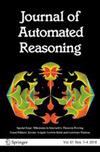精炼并行算法,直至 LLVM:应用于实际高效并行排序
IF 0.8
3区 计算机科学
Q4 COMPUTER SCIENCE, ARTIFICIAL INTELLIGENCE
引用次数: 0
摘要
我们提出了一种逐步完善的方法来开发经过验证的并行算法,并将其转化为高效的 LLVM 代码。这些算法的性能与用 C++ 实现的算法相比具有竞争力。我们的方法向后兼容 Isabelle 精炼框架,因此现有的顺序形式化可以很容易地进行调整或重新使用。作为案例研究,我们验证了一种并行快速排序算法,该算法与未经验证的最先进算法相比具有竞争力。本文章由计算机程序翻译,如有差异,请以英文原文为准。

Refinement of Parallel Algorithms Down to LLVM: Applied to Practically Efficient Parallel Sorting
We present a stepwise refinement approach to develop verified parallel algorithms, down to efficient LLVM code. The resulting algorithms’ performance is competitive with their counterparts implemented in C++. Our approach is backwards compatible with the Isabelle Refinement Framework, such that existing sequential formalizations can easily be adapted or re-used. As case study, we verify a parallel quicksort algorithm that is competitive to unverified state-of-the-art algorithms.
求助全文
通过发布文献求助,成功后即可免费获取论文全文。
去求助
来源期刊

Journal of Automated Reasoning
工程技术-计算机:人工智能
CiteScore
3.60
自引率
9.10%
发文量
31
审稿时长
>12 weeks
期刊介绍:
The Journal of Automated Reasoning is an interdisciplinary journal that maintains a balance between theory, implementation and application. The spectrum of material published ranges from the presentation of a new inference rule with proof of its logical properties to a detailed account of a computer program designed to solve various problems in industry. The main fields covered are automated theorem proving, logic programming, expert systems, program synthesis and validation, artificial intelligence, computational logic, robotics, and various industrial applications. The papers share the common feature of focusing on several aspects of automated reasoning, a field whose objective is the design and implementation of a computer program that serves as an assistant in solving problems and in answering questions that require reasoning.
The Journal of Automated Reasoning provides a forum and a means for exchanging information for those interested purely in theory, those interested primarily in implementation, and those interested in specific research and industrial applications.
 求助内容:
求助内容: 应助结果提醒方式:
应助结果提醒方式:


